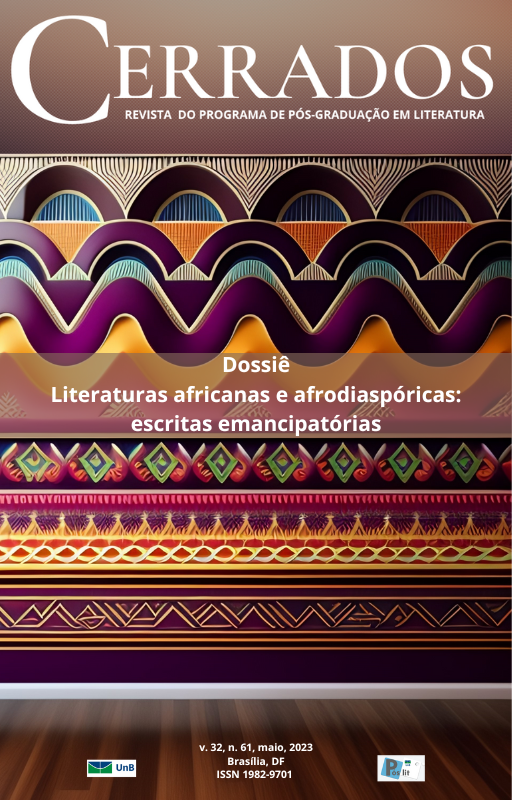Spatial Configurations:
Intersections of Race, Gender and Emancipatory Discourses in Toni Morrison’s Paradise
DOI:
https://doi.org/10.26512/cerrados.v32i61.45866Keywords:
Space, race, paradise, gender, emancipatory spacesAbstract
The aim of the present article is to propose an analysis of the spatial configurations in the novel Paradise, by the African American writer Toni Morrison. Morrison presents, through the spaces of Haven, Ruby and the Convent, the story of a community in search of a paradise, free from racial discrimination and where the black community can prosper. By presenting spaces that are constantly configured and reconfigured, and where people experience and reproduce relations of oppression, Morrison questions the concept of paradise conceived not only by the community but also the North-American imaginary. The feminine space of the Convent is presented, in turn, as the possibility of a feminine and emancipatory space, where women can perform alternative spiritualities and identities, share their life stories, and heal themselves.
Downloads
References
ANDRADE, B.C. Paraísos Perdidos e Reconstruídos: Avessos e Direitos na Construção Mítico-Utópica do Espaço Paradisíaco no Romance Paraíso de Toni Morrison. Revista Eutomia, vol. 2, dez. 2010.
BACHELARD, G. LEAL, A.C.; LEAL, L.V.S (trad.). A Poética do Espaço. São Paulo: WMF Martins Fontes, 2008.
DOUGLASS, Frederick. Autobiografia de um Escravo. São Paulo: Vestígio, 2021.
FOUCAULT, M. Space, Knowledge, Power apud FAUBION, J. Power. Londres: Allen Lane, 2000.
LOW, S. M.; LAWRENCE-ZÚÑIGA, D. Locating Culture. In: LOW, S. M.; LAWRENCE-ZÚÑIGA, D. (orgs.) The Anthropology of Space and Place: Locating Culture. Oxford: Blackwell, 2003.
MASSEY, D. Pelo Espaço: Uma Nova Política da Espacialidade. MACIEL, H.; HAESBAERT, R. (trad.). Rio de Janeiro: Bertrand Brasil, 2012.
MASSEY, D. Space, Place and Gender. Minneapolis: Polity, 1994.
MORRISON, T. Paraíso. SIQUEIRA, J.R. (trad.). São Paulo: Companhia das Letras, 1997.
MORRISON, T. Playing in the Dark: Whiteness and the Literary Imagination. Nova Iorque: Vintage, 1993.
SPAIN, D. Gender and Urban Space. Annual Review of Sociology, vol. 45, n.2, 2004, p.276-299.
SUNDSTROM, R. R. Race and Place: Social Space in the Production of Human Kinds. Philosophy & Geography, v. 6, 2003, p. 83-95.
TUAN, Y.-F. Space and Place: the Perspective of Experience. 8th Printing. Minneapolis: University of Minnesota Press, 1977.
Downloads
Published
How to Cite
Issue
Section
License
Copyright (c) 2023 Revista Cerrados

This work is licensed under a Creative Commons Attribution 4.0 International License.
Proibida a reprodução parcial ou integral desta obra, por qualquer meio eletrônico, mecânico, inclusive por processo xerográfico, sem permissão expressa do editor (Lei n. 9.610 de 19/2/1998 )



